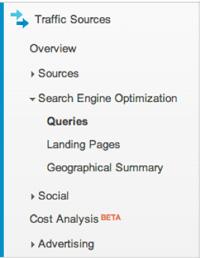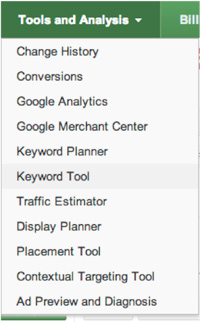Keyword Strategy
If you are not writing with keywords in mind, you may be wasting effort, as you aren’t maximizing the ability for people to find your content.
There are different schools of thought when it comes to keyword usage in your content. For the sake of illustration, I will start with the two extreme profiles of content creators when it comes to keyword usage, the writer and the stuffer.
The writer produces content refusing to change any words to suit a search engine. They are wordsmiths/masters, and they consider their content as a work of art. For the writer who has a substantial audience, no keyword strategy is needed. For those who do not, it might be time to set aside the ego and play a game with the search engines.
The keyword stuffer does extensive keyword research and incorporates their findings into every page as often as they can, disregarding readability and trying to manipulate the search engines. My opinion (no offence stuffers), this strategy that should not have worked, but unfortunately did for a while. Today, this is obsolete.
The right strategy is somewhere in the middle. You must write your content for people but tweak it for the engines to ensure crawlers can digest the data and associate with some form of topic or concept. The trick is to incorporate keywords into sentences naturally. Ideally, the reader should not know a keyword is targeted and ensuring your content relates to your site’s topic for consumption.
Since you want only relevant traffic coming to your website, let’s get started by creating a list.
Getting Keyword Ideas
The best way to start is to think of words you or your customers might use to describe your own business. Also, talk to your sales and customer service staff to find more search terms. At this point, brainstorming is beneficial and don’t ignore any suggestions as they may lead to a potentially excellent keyword.
Next, supplement your list by going to your competitors’ sites and checking out the title of the page. You can also find potential keyword opportunities in Google Analytics by seeing how your users got to your website. If you see a low click-through rate beside the keywords, consider tweaking your meta title and description to make it more compelling for users to click.

The next step is to make your list a lot bigger! To do this, we suggest using the Google Adwords keyword tool. Go to adwords.google.com and click on Tools and Analysis in the menu, followed by the Keyword Tool.

Now select the option titled Search for keyword and ad group ideas. Once there paste in your entire list of brainstormed keywords in the ‘Your product or service’ box, then click Get Ideas. Now a list of ad group ideas will be displayed. Click the keyword ideas tab to see all of the keywords ungrouped. We recommend working out of this tab, so no keyword gets looked over.
You are now looking at a list of around 800 keyword suggestions sorted by relevance. It would be best if you look at all the keywords, not only the first 25. Hopefully, you find some hidden gems that your competition might have missed. The goal at this point is to make a list of all the keywords that you feel are of high quality and relate well to the products, services and content that is on your website.
How Many Searches?
The next step is to determine the amount of traffic each keyword gets. Again you will need to Google Adwords and select Tools and Analysis followed by the Keyword Planner tool. This time you will select the section option titled, Enter or upload keywords to see how they perform. Enter your new refined quality list into the appropriate box then click Get Search Volume [not Get Estimates].
Once there, it will show you all of your keywords with their average monthly searches (traffic) beside it. While this traffic data isn’t perfect, it is a good enough representation to start to whittle down the list and prioritize your efforts.
Now you are going to automatically remove all of the keywords from your list that have 0 search volume beside it. You have to define how low is too low for the search volume of other keywords. Keyword volume depends on how niche your product is and how much a sale is worth to you. It is usually better to target terms that receive more traffic. However, more traffic is not always a good thing because the better, higher traffic keywords typically have much more competition. We’ve seen cases where keywords with 100 – 200 searches per month end up being our highest converting because the connection between the searcher’s intent and what we’re offering is aligned.
Difficulty
Keyword difficulty is a relative term. It depends on how much authority your site has versus your competition. If you are selling IBM servers and you are not IBM, it is unlikely that you will be on the first page (organically) for the keyword ‘IBM Servers.’ However, if you stretch out the keyword term to 4+ words, you can get very specific, thus giving yourself a much higher chance at ranking. We call wordy search terms long-tailed.
However, if you’re IBM and you decide that you want to sell third party accessories and add-ons, you can easily outrank the sites that make the products.
Testing & Reporting
It is essential to keep track of the keywords you are trying to rank for tracking conversion rates and bounce rates over time.
We recommend using UTM links for tracking keywords across multiple mediums across the web, all through Google Analytics. A UTM code adds a suffix to the end of your URL for tracking purposes. UTM codes are typically for tracking paid adverting, and other services such as RSS feeds. Here is a link to Google’s URL builder.
If there is a budget in your organization, we recommend testing your keywords with Google Adwords to determine effectiveness. Testing could help you with your long-term SEO strategy learning keywords that are complete duds and others that are very easy to monetize.
Conclusion
Your goal should always be trying to find the perfect marriage with quality keywords, high search volume and low competition.

Evan White
Director, Digital Marketing
Evan is a tech geek that has helped public companies, Fortune 500 enterprises, and SMB clients implement technical solutions to their marketing challenges.
He has a wide range of knowledge of website design and development, search engine optimization, and digital marketing. You'll often find him obsessing about the SEO of a page or the speed of a website. Read more of his blog posts here.
His bookmarks include links to tech blogs, The Economist and Formula 1 news. When not geeking out, you'll find Evan travelling or playing beach volleyball.